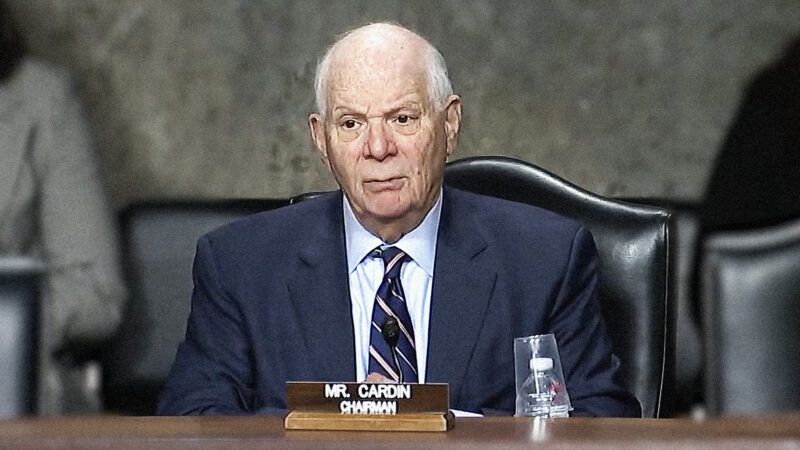Yet Another Senator Bungles the First Amendment To Justify Censorship
This week, a clip of Maryland Sen. Ben Cardin claiming that speech that espouses "hate" and "violence" is not protected by the First Amendment made the rounds on Twitter, sparking sharp backlash.

While misconceptions about free speech run rampant, it's always surprising when the person spouting falsehoods about what the First Amendment protects is someone with real political power. Earlier this week, Sen. Ben Cardin (D–Md.) made such an error, asserting during a Senate hearing that the First Amendment doesn't protect those who espouse "hate" or "violence." Not only is this claim brazenly wrong, but the fact that Cardin was using this misconception to justify online censorship makes it particularly frustrating.
On Wednesday, Cardin posted a clip to Twitter from a closing statement he made during a December 13 Senate hearing on antisemitism. In the clip, Cardin states that "if you espouse hate, if you espouse violence, you're not protected under the First Amendment. So I think we can be more aggressive in the way that we handle that type of use of the internet. We know that Europe has done things, and I think we have to learn from each other." The tweet accompanying the clip reads "Our first amendment is one of the defining jewels of this country. It is NOT a free pass to spew violent rhetoric."
The clip was also posted by The Hill, whose tweet eventually gained over 600 quote tweets and 1.7 million views. The backlash to the senator's comments was swift, with hundreds of replies jumping to correct Cardin.
"Hate speech is absolutely protected by the First Amendment—explicitly so, according to the Supreme Court," Reason's Robby Soave tweeted about the incident. "Embarrassing when people don't know this, moreso when it's a U.S. senator."
On Thursday, Cardin appeared to backtrack, tweeting an extended clip of his original comments with the caption, "Hate speech is protected under the #FirstAmendment, unless it incites violence. #context." In the clip itself, Cardin is shown prefacing his original statement by adding that he believes the government should begin regulating internet speech, saying "I do think there's a role for government, consistent with our First Amendment, for us establishing parameters."
While Cardin is correct to note that "hate speech" is legally protected unless it falls under another category of unprotected speech, like incitement of violence, the additional context does not make his assertions any more legally correct. Speech that "espouses hate" is almost universally protected by the First Amendment, and speech that "espouses violence" also has a surprisingly high chance of being protected. In fact, the legal bar for incitement of violence is so high that even the most aggressive online speech would probably have a slim chance of actually being declared an incitement of violence. As the Foundation for Individual Rights and Expression (FIRE) notes, "Mere advocacy of lawbreaking or violence remains protected speech as long as it is not intended to and likely to provoke immediate unlawful action." Other categories of unprotected speech that might "espouse violence," like harassment or true threats, have similarly high bars.
Further, Cardin's comments consist of more than just a simple misunderstanding of constitutional law. They reveal a troublingly common view on tech censorship—one that is increasingly present on both the left and right. For Cardin, and many others, the presence of online speech he finds distasteful—in this case, speech which is "hateful" or apparently "violent"—is worthy of government regulation and intervention. While this push toward technocratic intervention in Big Tech is increasingly popular on the left, support for government censorship is also endemic on the right. Republican lawmakers are increasingly calling for government censorship of library books and critical race theory—not to mention attacks on social media companies' First Amendment right to kick disfavored users and content off their sites.
Unfortunately, as Cardin's comments show, the First Amendment seems to be going out of style on all sides of the political spectrum.

Show Comments (97)